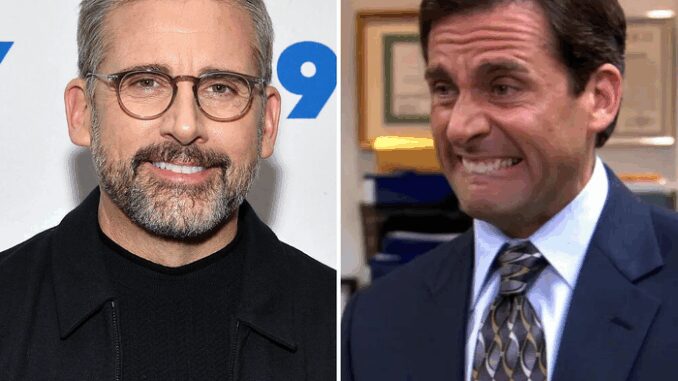
Becoming Michael Scott: Steve Carell’s Iconic Transformation
In the vast landscape of television comedy, few characters have etched themselves into the cultural consciousness with the same indelible mark as Michael Scott, the regional manager of Dunder Mifflin's Scranton branch. Yet, the brilliance of this portrayal lies not just in the character's absurdities, but in the seemingly impossible act of alchemy performed by the actor behind the desk: Steve Carell. His transformation into Michael Scott was not merely a role assumed; it was a chameleonic metamorphosis that redefined Carell's comedic identity, elevating him from a respected comedic actor to an icon, and imbuing a cartoonish boss with surprising layers of cringe, pathos, and humanity.
Before stepping into Michael’s ill-fitting suit, Steve Carell was known for a particular brand of humor – often the subtly awkward, slightly bewildered, but ultimately kind-hearted straight man. From his deadpan delivery as a correspondent on The Daily Show with Jon Stewart to the hilariously dim-witted Brick Tamland in Anchorman, Carell excelled at playing characters who were, in some way, endearing in their naiveté or understated eccentricity. He was a master of the slow burn, the quiet reaction, the humor derived from absurdity played straight. This established persona was in stark contrast to the bombastic, desperately approval-seeking, and often offensive buffoon that was David Brent, the character Michael Scott was based on in the original British Office. The challenge, therefore, was immense: how to take a character steeped in British cringe and make him uniquely American, distinct yet equally compelling, without simply imitating Ricky Gervais?
Carell’s genius lay in his decision to lean into Michael’s foundational desires rather than solely his flaws. While Brent’s cringe often stemmed from an almost malevolent self-aggrandizement, Carell’s Michael was rooted in a profound, almost childlike, need to be loved, admired, and seen as the "cool boss" or the "funniest guy." This became the engine of Michael’s most excruciating moments. His ill-advised jokes (“That’s what she said!”), his forced attempts at camaraderie (like the infamous "Diversity Day" where he mimics various ethnic accents), or his desperate musical performances, weren’t born of malice but of a profound insecurity and a tragically misguided sense of how to connect with people. Carell embodied this desperation physically: the way his eyes would dart around, seeking approval after a bad joke, the forced, toothy smile that plastered his face even when he knew he’d offended someone, or the awkward lean-back in his chair, trying to appear nonchalant when confronted.
What elevated Carell’s transformation beyond mere caricature was his ability to inject startling moments of vulnerability and pathos into a character designed for laughs. He masterfully navigated the tightrope between hilarious idiocy and heartbreaking loneliness. Consider episodes like "Dinner Party," where Michael’s toxic relationship with Jan is laid bare, revealing a man yearning for domestic bliss but utterly incapable of achieving it healthily. Carell peels back the layers, allowing glimpses of Michael’s deep-seated insecurities, his unfulfilled desires, and the sheer desperation that drove many of his worst impulses. In "Scott’s Tots," despite the overwhelming cringe of his broken promise, Carell still manages to convey Michael’s genuine, if misguided, intent and his subsequent crushing shame. These moments weren't just comedic relief; they were a testament to Carell’s understanding that true comedy often emanates from a place of very real human emotion. He didn't just play Michael Scott; he felt Michael Scott.
Carell's vocal and physical choices were equally instrumental in this iconic transformation. His voice, typically a smooth baritone, would shift dramatically for Michael – often rising in pitch when excited or stressed, punctuated by forced laughs or whiny pleas. His body language was a masterclass in awkwardness: the stiff walk, the performative gestures that felt rehearsed yet landed flat, the way he would sometimes just stand too close, or make uncomfortably intense eye contact. These minute details, meticulously crafted by Carell, built a character so distinct and consistent that he felt utterly real, despite the outlandish scenarios he found himself in. The iconic “No! God, please, no!” reaction shot isn't just a line; it’s a full-body expression of existential dread, perfected by Carell’s commitment to the character’s internal world.
Ultimately, Steve Carell’s transformation into Michael Scott was an acting triumph because it transcended simple character portrayal. It was a complete reinvention of a comedic persona, a brave dive into the depths of human awkwardness and aspiration, and a nuanced exploration of a character who was simultaneously hilarious, frustrating, and, against all odds, occasionally lovable. He didn't just put on a wig and a suit; he embodied Michael's desperately beating heart, creating a cultural touchstone that continues to resonate. The iconic status of Michael Scott is not just a testament to brilliant writing, but to Steve Carell's unparalleled ability to breathe life, laughter, and a surprising amount of soul into the world's most impossible boss.